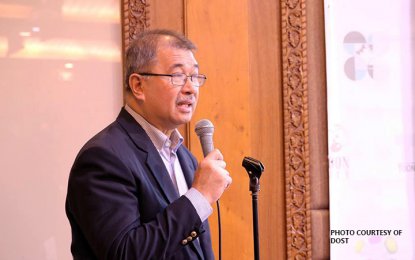News
DOST eyes 235 more Balik Scientists ’til 2022
MANILA — The Department of Science and Technology (DOST) eyes to tap 235 more “Balik Scientists” from 2018-2022, DOST Secretary Fortunato Dela Peña told the Philippine News Agency (PNA) on Friday.
Balik Scientists are science and technology experts residing abroad and who are contracted to return to the Philippines to work and use their expertise in the country.
Since the Balik Scientist Program’s establishment in 1975 up to December 2017, the Philippines has had a total of 567 Balik Scientists.
The DOST targets 41 Balik Scientists in 2018, and increase this number by three each year until 2022.
“We project around 60 (Balik Scientists) per year after the BSP (Balik Scientists Program) becomes a law. So even if we just got 35 for this year, and if we’ll have 50 per year for the next four years, that would still total to 235 by 2022,” Dela Peña said.
Dela Peña earlier expressed his desire to encourage more Filipino scientists to return to the country, as he believes they would be very helpful in providing translational research.
The Secretary admitted it is not easy to encourage scientists living abroad to come back, especially those who are already earning well in other countries.
To address this and the other challenges that make the potential Balik Scientists think twice about coming back, the DOST provides several incentives to Balik Scientists.
The Philippine government, through the DOST, has established the Balik Scientists Program in 1975 to address the lack of researchers here and also to help improve the country’s science programs.
Those who will avail of the program can choose to stay for 30-90 days to get short-term incentives, or for two to three years to get the long-term incentives.
For the program’s short-term incentives, the DOST will shoulder the Balik Scientists’ roundtrip airfare, and will also provide them with a daily allowance of USD150.
For the long-term incentives, on the other hand, the DOST will shoulder the one-way airfare of the scientist, his or her spouse, and two minor dependents. A prepaid return airfare will also be provided upon serving the scientist’s contract. Scientists may also receive research funding (upon request), and an honorarium from the host institution, which could be a local or private institution seeking technical assistance.
Dela Pena earlier cited that institutionalizing the Balik Scientist Program would be a huge help to encourage more Balik Scientists.
Institutionalizing the program would make it easier for the scientists to process their entry requirements, since the law will allow them to process their visa and immigration requirements faster. This is essential, especially for those who were already granted foreign citizenship, he explained.
Dela Peña added that the law must also provide remuneration for the Balik Scientists.
In a previous interview with the PNA, Reynaldo Ebora, acting executive director of the DOST-attached agency Philippine Council for Agriculture, Aquatic and Natural Resources Research and Development (PCAARRD), explained that once the Balik Scientist Program becomes a law, the Balik Scientists’ entitlements would increase. So would their current USD150 daily allowance.
Meanwhile, some of the DOST’s priority areas with identified gaps are forestry Research and Development (R&D), crops R&D, climate change adaptation and disaster risk reduction, aquatic R&D, natural resources and environment R&D, livestock R&D, socio-economics and policy research, and technology transfer.
The DOST targets Balik Scientists who will work on these areas.






















